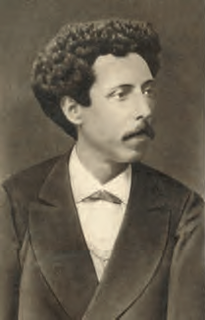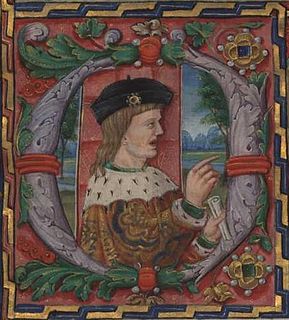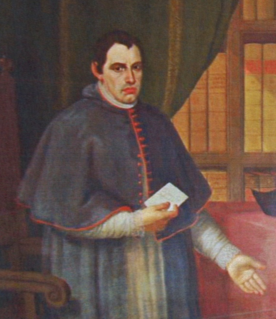
DomMiguel I, nicknamed "the Absolutist", "the Traditionalist" and "the Usurper", was the King of Portugal between 1828 and 1834, the seventh child and third son of King John VI and his queen, Carlota Joaquina of Spain.

D. Pedro de Sousa Holstein, 1st Duke of Faial and Palmela was one of the most important Portuguese diplomats and statesmen in the first half of the 19th century. He also served as the country's first modern Prime Minister.

Dr José Tomás de Sousa Martins was a doctor renowned for his work for the poor in Lisbon, Portugal. After his death, a secular cult arose around his personality in which he is thanked for "miraculous" cures.

Luís da Silva Mouzinho de Albuquerque was a Portuguese military officer, engineer, poet, scientist and politician, who distinguished himself during the Liberal Wars and in the conflicts that marked Portugal's history in the first half of the 19th century. He served as the Minister of the Kingdom during the liberal regency of Pedro of Braganza. This was the most prominent post inside the government at that time, which made him the Prime Minister of Portugal in all but name. He was also several times minister and deputy minister during the Constitutional Monarchical period. Among other offices, he served as Chief of the National Mint, captain-general and governor of Madeira, and inspector-general of public works. He was the grandfather of Joaquim Augusto Mouzinho de Albuquerque, a military officer and colonial administrator.

Francisco de Borja Garção Stockler, 1st Baron of Vila da Praia, was a lieutenant general and the 8th Captain General of the Azores, politician, and mathematician.

Portuguese customary units were used in Portugal, Brazil and other parts of the Portuguese Empire until the adoption of the metric system in the 19th century.
João Soares de Albergaria de Sousa, frequently referred to as João Soares de Albergaria, was a liberal politician, rural landowner, and author of the 1822 manifesto Corografia Açórica, the first thesis on Azorean regional sovereignty.
Miguel António de Sousa Horta Almeida e Vasconcelos, 2nd Baron of Santa Comba Dão was a Portuguese nobleman.
António Osório Sarmento de Figueiredo Jr. was a Portuguese nobleman, jurist, politician and magistrate.

Sebastião Custódio de Sousa Teles, also known as Sebastião Teles, Sousa Teles, or in contemporary Portuguese as Sousa Telles, was a Portuguese politician and military officer. After a career in military logistics and education, he served multiple times as Minister of War, and briefly as President of the Council of Ministers from 11 April to 14 May 1909 during the penultimate year of the Portuguese constitutional monarchy.
Events that happened in the year 1838 in Portugal.

Sousa is a noble family of Portugal.
The following is a timeline of the history of the city of Coimbra, Portugal.

D. João de Sousa was a Portuguese prelate, Bishop of Porto, Archbishop of Braga and Archbishop of Lisbon.

Summer architecture was a Portuguese architectural movement originating in the Portuguese Riviera, in late 19th and early 20th century, when the region became a popular resort destination for the Portuguese Royal Family and the Portuguese aristocracy. The movement is not characterized by any single architectural style or artistic school, but rather unified by common themes, including leisure, wellness, exoticism, and heterotopia.
Devourism was the pejorative term to describe the political regime which established itself in Portugal following the Liberal Wars, particularly during the period from 24 September 1834 to 9 September 1836, while the Constitutional Charter of 1826 was in effect. It was intended to convey a sense of unprincipled greed, whereby leading politicians spent public funds in abundance to secure personal gain for themselves or their associates. The term was coined after a piece of legislation was drafted on 15 April 1835, which provided for the sale of national property and property of the Catholic Church, and facilitated their disposal among leading members of the liberal party.

Frei Francisco de São Luís, O.S.B., religious name of Francisco Manuel Justiniano Saraiva and today more commonly known as Cardinal Saraiva, was a Portuguese Cardinal of the Catholic Church, who was the eighth Patriarch of Lisbon from 1840 to 1845.

Bernardino António Gomes was a Portuguese physician and scientist. He is perhaps most widely remembered for his pioneering work in Portugal in the field of anaesthesiology, as the first physician in the country to use chloroform in a surgical procedure ; he is also credited with the popularization of the use of creosote and of the first ether inhalers.
Maria Lúcia Amaral is a Portuguese lawyer, university professor, politician and judge. She was vice-president of the Constitutional Court of Portugal and is Portugal's 10th Ombudsman, being the first woman to hold this post.












